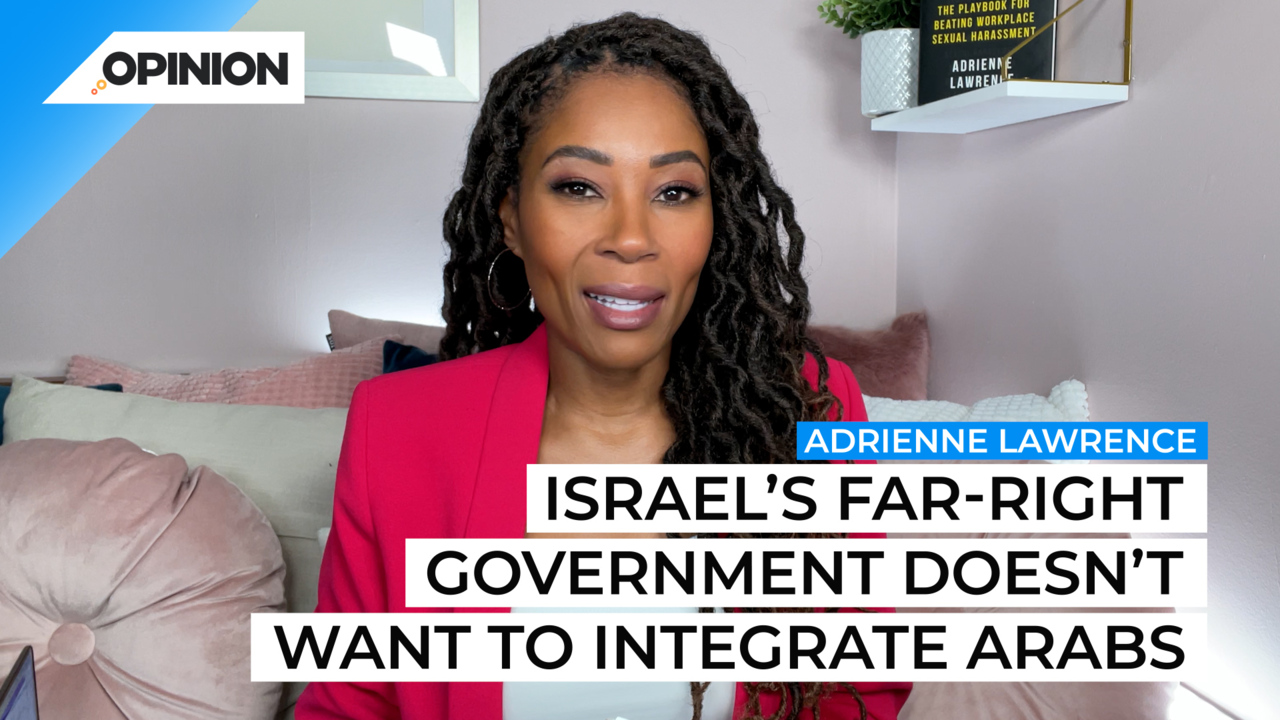
Commentary
-
Our commentary partners will help you reach your own conclusions on complex topics.
The news of the violent clashes between Israeli and Palestinians in the West Bank in Gaza often lead headlines. But what’s less discussed is the interaction between the two groups within the borders of Israel, as they’re defined by international law, that is. Now I gained firsthand knowledge recently, as an expert in desegregating workplaces. I was invited by Israel’s Ministry of Foreign Affairs to participate in its first ever social impact delegation. And there I joined a group of experts and intellectuals in candid conversations with leaders in Israel’s public and private sectors, from pro-Palestinian journalists, to former cabinet members. We met a number of individuals, many of whom are Brown and Black, and they’re fighting there for equity.
And for days, we talked about the inequities that Palestinians living in Israel, and other marginalized people are facing there, and also what’s being done to really ameliorate the harm. So here’s the gist of what’s going on to desegregate Israel, how it really works, and whether I think it’ll actually work. So first, it is important to know that Israel is segregated and racial discrimination there is real. Arab and Jewish communities by and large live, work, educate and do everything separately, with Arabs relegated to areas that are less desirable and often neglected. And even in a few mixed cities, there are still many segregated areas. The Council on Foreign Relations explains the root of the segregation between Jews and non-Jews.
This continuing separation is due to factors including the legacy of restrictions imposed at the time of Israel’s founding, which outline where non-Jewish Israelis can live, separated schools and labor laws that discriminated against Arabs, as well as prevailing prejudices against Arab citizens residing in Jewish neighborhoods.
Now, bear in mind that Arabs are nearly 22% of Israel’s population, and the vast majority of them are Palestinians. Also Ethiopian Jews are about 2% of the population. And although they’re often left out of the conversation, and many conversations, they definitely suffer discrimination and segregation in Israel, too.
So that’s near 25% of Israel’s population, living in an unofficial Jim Crow. That’s huge, because that’s 25% of the population also boxed out of good jobs due to discrimination. That means that they’re also boxed out of fully contributing to Israel’s economy too, but Israel still must care for them using tax dollars because they are citizens. And I’m no economist, but I can surely tell you that that’s not sustainable. In fact, Israel cannot survive unless there’s greater workforce participation from those who have been excluded.
The situation is so bad that in 2018, well, the Organisation for Economic Cooperation and Development said in a report that Israel must integrate its Arab population or risk economic collapse for all of Israel. And it wasn’t just the Arab population, however, that they noted. It was also the integration of the ultra-Orthodox, you know, the ones that just put Prime Minister Benjamin Netanyahu back in power. Well, the ultra-Orthodox Jews, they make up around 15% of Israel’s population, and they are growing in numbers with the average family having six children. But a large number of the men do not work. They are opting to study religious texts in exchange for a government stipend. Also, the job market for ultra-Orthodox women is really limited due to pregnancy practices, location, discrimination, lack of access and so on.
The situation adds to the predicament here as Israel’s government is not in a good place. Even the OECD, they acknowledge in their 2018 report this: if the authorities fail in their enhanced integration efforts, and these groups — Arabs and the ultra-Orthodox — keep their current employment and productivity gaps, average Israeli incomes would fall to close to 30% below the OECD average in 2059, almost double the current gap.
So let’s talk about what Israel is doing. Israel’s government is investing in a plan to desegregate and to reduce discrimination predominantly in the Arab communities, as the Council on Foreign Relations explained at the close of last year.
In 2021, the government approved a five-year plan to boost employment, improve health care services and housing and develop infrastructure, among other goals for the so-called Arab sector. The plan, set to cost over $9 billion, follows a similar initiative by the previous Prime Minister Benjamin Netanyahu, who designated more funding for the sector than any of his predecessors, even as he frequently incited anger toward the Arab community.
Now I have the honor of meeting many of those people who are implementing the plan and they are down. They’re educating about anti-Arab biases, anti-Black biases, pouring funds into training Arab women in education fields and professions where they’re unrepresented, also upping the budget of agencies so that they can prosecute discriminatory employers, and also funding anti-racism units that hold state workers accountable.
They are doing the business and these efforts, they clearly come from a humanitarian place. But of course, those who control the government are largely motivated by economics, as they should be for the reasons I explained. The reality is that experts have long known that discrimination and discriminating against people, it means that a government, an entity, an organization is in a bad position. It is costly and expensive. Look at the US. If they didn’t hold so much on a racial bias, we’d be, what, $51 trillion richer. Yeah, that’s right, because there’ll be fewer gaps in employment, education, earnings across the races. But hey, why not let go of your biases when you can not be a legend at the bank? Yeah, I guess that makes sense to some extent, or not. Still, we have a problem.
And Israel is putting in the work so that its problem hopefully goes away. But I don’t know that it’s going to succeed. Because with its new right-wing leadership in place, Israel doesn’t have the time that it would need to desegregate. The country has been segregated between Jews and non-Jews for some 75 years since its formation. You know, it takes decades to get people to overcome their internalized biases — and also not to mention underlying resentment that comes from being marginalized.
The last school that desegregated in the United States was in 2016. Yeah, 2016 – 62 years after the Supreme Court issued Brown v Board of Education. And although Israel is a much smaller place than the US, and segregation is definitely still an issue here, I fear that Israel does not have 62 years, or even half that time, to do better than we’ve done.
Israel’s new Minister of National Security, Itamar Ben-Gvir, leads Israel’s Jewish power movement — that’s a far-right party that fears what’s going to happen when the country has a non-Jewish majority in the coming years.
And instead of helping people to learn to live together harmoniously and really backing inclusion, well, Ben-Gvir is rallying people against Arabs in particular and also, of course, other people, you know, with this goal of removing them from Israel under the guise of disloyalty, and he’s expediting gun licenses for Israelis. And he also implicitly advocates for the killing of Arabs, who, as I mentioned, are more than 20% of Israel’s population and the vast majority are of Palestinian descent.
Ben-Gvir’s party also has said that it’s aiming to shut down the near $10 billion integration and inclusion plan for the Arab community. And they’re blanketly claiming that it’s because it funds terrorism. Yeah, his entire agenda is to stop progressives from desegregating Israel, and to advance discrimination to the point of justifying exclusion of Brown and Black people in Israel.
Yeah, so instead of integration, it’ll be annihilation, and its likelihood of happening is getting closer by the day. Israel needs to address its economic issues, in the now, and it can either get alone, accelerate desegregation, or sharply reduce its population. I can pretty much tell you which option Ben-Gvir and his right wing coalition would prefer. Either way, we can’t just focus on resolving segregation and discrimination that goes on in the West Bank, Gaza or at Israel’s borders. We also have to uplift efforts going on within the borders.
-
Why didn’t Netflix, Oscars vet Karla Gascón’s social media?
Karla Sofía Gascón, star of the Netflix show Emilia Pérez, had her bid for an Oscars nomination disrupted recently when some of her old social media posts from 2016-2022 went viral. In various statements, Gascón criticized major world religions, including Islam, Christianity and Catholicism, called George Floyd a “drug addict swindler,” and even called the… -
FCC investigation into Comcast a blatant attack on free speech
The Federal Communications Commission’s (FCC) Enforcement Bureau launched an investigation into Comcast for allegedly “promoting invidious forms of DEI in a manner that does not comply with FCC regulations.” The FCC’s action follows President Donald Trump’s executive order ending diversity, equity and inclusion (DEI) programs across the federal government and directing U.S. agencies to “encourage… -
Hold Trump accountable for defying the rule of law
Since his return to the White House less than three weeks ago, President Donald Trump has enacted a series of executive orders and actions that have drawn both criticism and support. Legal and policy experts have raised concerns, with some arguing that these measures are illegal, unconstitutional, and a threat to U.S. national security. Some… -
Trump’s foreign policy is ‘America Alone,’ not ‘America First’
President Donald Trump is radically remaking U.S. foreign policy just days into his second term, issuing threats against close U.S. allies and partners like Denmark, Canada, Panama, Colombia and more. European powers are scrambling to prepare for any scenario where the United States under Trump seeks to conquer Greenland through military force, an act which… -
Trump’s immigration crackdown threatens US innovation
President Donald Trump’s immigration crackdown, which has led to large-scale arrests across the U.S., has drawn both praise and outrage. Trump and his supporters argue that his actions protect national security and American jobs by targeting undocumented immigrants. Opponents, however, contend that mass deportations not only separate families and harm communities but also remove workers…
Latest Opinions
-
 Getty Images
Getty Images
NFL scouting combine: How much faster can these players run?
-
 Getty Images
Getty Images
James Cameron seeks New Zealand citizenship following ‘horrific’ Trump re-election
-
 Getty Images
Getty Images
San Francisco DA Charges 11 in SNAP fraud scheme involving $4M
-
 Getty Images
Getty Images
California’s minimum wage increase led to job losses, higher prices: Study
-
 Getty Images
Getty Images
Appeals court blocks Arizona’s proof of citizenship law, cites voter suppression
Popular Opinions
-
In addition to the facts, we believe it’s vital to hear perspectives from all sides of the political spectrum.






